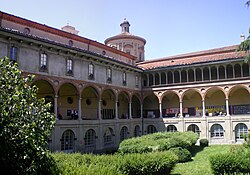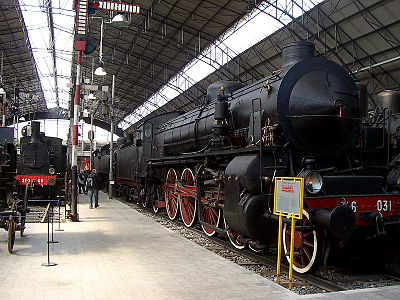Museo Nazionale Scienza e Tecnologia Leonardo da Vinci
 National Museum of Science and Technology | |
 Interactive fullscreen map | |
| Established | 1953 |
|---|---|
| Location | Via S. Vittore 21 – 20123 Milan – Italy |
| Coordinates | 45°27′44.978″N 9°10′11.636″E / 45.46249389°N 9.16989889°E |
| Director | Fiorenzo Galli |
| Website | museoscienza.org |
Museo Nazionale Scienza e Tecnologia Leonardo da Vinci in Milan, dedicated to painter and scientist Leonardo da Vinci, is the largest science and technology museum in Italy. It was opened on 15 February 1953 and inaugurated by Prime Minister Alcide De Gasperi.[1]
The museum, in the ancient monastery of San Vittore al Corpo in Milan, is divided into seven main departments:[2]
- Materials
- Transport
- Energy (including Thermal power station Regina Margherita)
- Communication
- Leonardo da Vinci, Art & Science
- New Frontiers
- Science for young people
Each of these departments have laboratories, especially for children and young students. The Transport section is made up of four different parts: air, rail, water and Submarine Enrico Toti-S-506.[3]
Materials section
The Materials section treats the life cycle of modern products from raw materials to recycling. Specific sections are dedicated to polymeric and synthetic materials and to basic chemical manufacturing. There is also a metal section that illustrates the metal extraction and processing techniques and exhibits the first electric arc furnace for melting steel invented in 1898 by Ernesto Stassano.
Transport section

The Transport section is divided in four different sections:
- The Air transport section exhibits several aircraft including a Farman 1909 replica and an original Macchi MC 205 V used by the Regia Aeronautica Militare Italiana during the Second World War. There are also several modern military aircraft like an Italian Fiat G.91, a North American F-86K and a Republic F-84F Thunderstreak.
- The Rail Transport section is sited in a pavilion from the 1906 Expo with an added reconstruction of a late 19th-century railway station facade. The collection exhibits vehicles from the 19th and 20th centuries with a particular focus on the historical public transport of Lombardy.
- The Water transport section displays the bridge of the transatlantic liner Conte Biancamano, and the training ship Ebe launched in 1921. Also exhibited are a slow running torpedo (or Maiale) and an explosive punt (1940) both used by the Italian Royal Navy in the Second World War.
- The last section is dedicated to the Toti-class submarine Enrico Toti, built by Italian shipbuilders after the Second World War for the Italian Navy and launched in 1967.
Energy section
The Energy section is dedicated to energy sources and devices. In this part of the museum there is the Margherita thermoelectric power station (1895) and an oil industry/petrochemistry section.

Communication section
The Communication section is divided into three areas:
- The Astronomy section shows several antique astronomic and topographical instruments, including two 17th-century celestial and earth globes, the Salmoiraghi refracting telescope, and a Foucault pendulum.
- The Telecommunication section is dedicated to all forms of modern-era communication from telegraph to telephone and wireless communication, and from radio to television, with a global view of the technical history of Italian television.
- The Sound section shows the main technologies for recording and reproducing sound from the 19th century to modern times.
Leonardo da Vinci, Art & Science section

The Leonardo da Vinci, Art & Science area is divided into four parts:
- The Jewelry collection shows precious objects from stones and gems to metals, including gold and ivory jewellery.
- The Leonardo da Vinci section exhibits many Leonardo machines reproduced from Da Vinci drawings,[4] including a hydraulic saw, a spinning machine, a flying machine and Leonardo's tank. The models of the collection are the fruit of a reinterpretation by a group of experts who have translated and completed his drawings.
- The Horology collection shows the evolution of watchmaking and shows several pendulum clocks, ancient clocks, personal watches and tower mechanisms.
- The Musical Instruments section exhibits instruments from the 17th to the 20th century. There is a reconstruction of a lute maker's workshop from the 17th century.
Gallery
- View of some trains in the museum.
- Another view of the rail section of the museum.
- An Italian Financial Guard helicopter.
- Control room for torpedoes of Submarine Enrico Toti-S-506.
- An Italian Human Torpedo.
- The Cenacolo hall, frescoed by Pietro Gilardi
See also
References
- ^ "Museo Nazionale della Scienza e della Tecnologia "Leonardo da Vinci"". www.museoscienza.org. Retrieved 19 April 2018.
- ^ "Departments – museoscienza". www.museoscienza.org. Retrieved 19 April 2018.
- ^ "Sottomarino S-506 Enrico Toti – museoscienza". www.museoscienza.org. Retrieved 19 April 2018.
- ^ Giorgione, Claudio (13 October 2015). "The birth of a collection in Milan: from the Leonardo Exhibition of 1939 to the opening of the National Museum of Science and Technology in 1953". Science Museum Group Journal. 4 (4). The Science Museum. doi:10.15180/150404. ISSN 2054-5770. Archived from the original on 14 February 2022.
External links
- Official website
- Virtual tour of the Museo Nazionale Scienza e Tecnologia provided by Google Arts & Culture
 Media related to Museo Nazionale della Scienza e della Tecnologia (Milan) at Wikimedia Commons
Media related to Museo Nazionale della Scienza e della Tecnologia (Milan) at Wikimedia Commons













